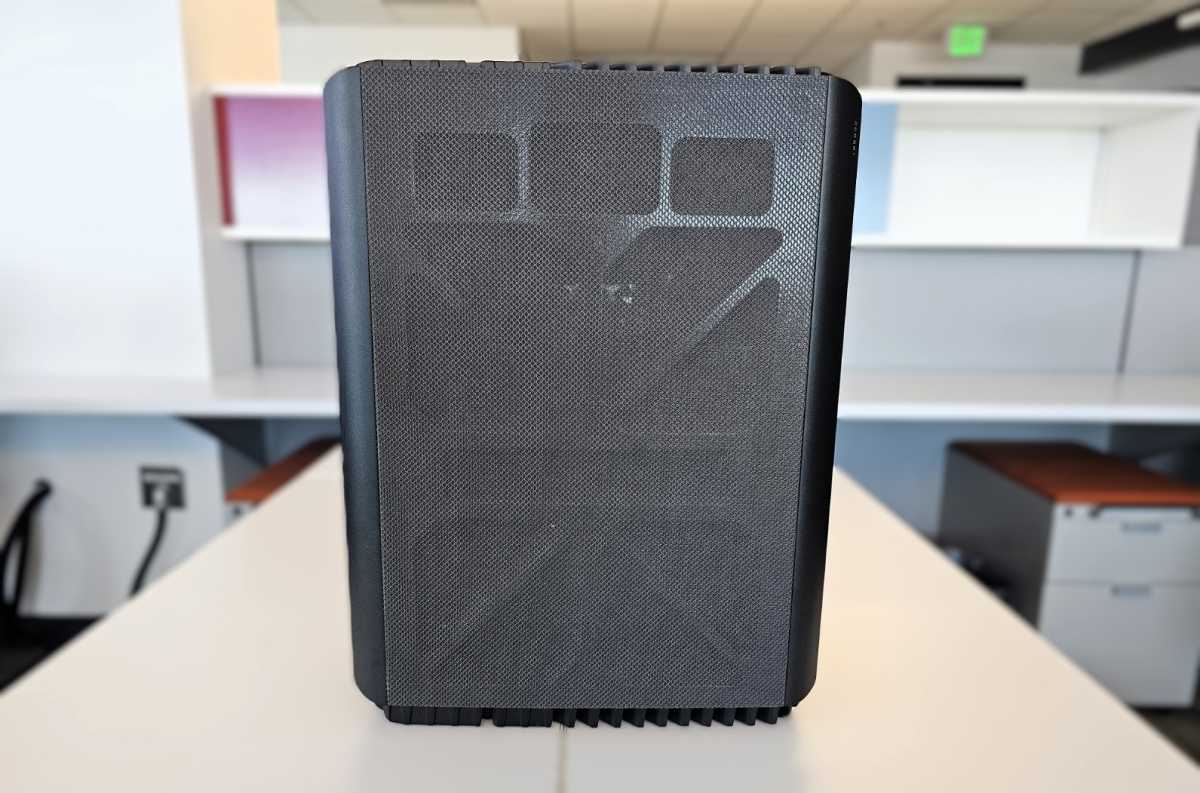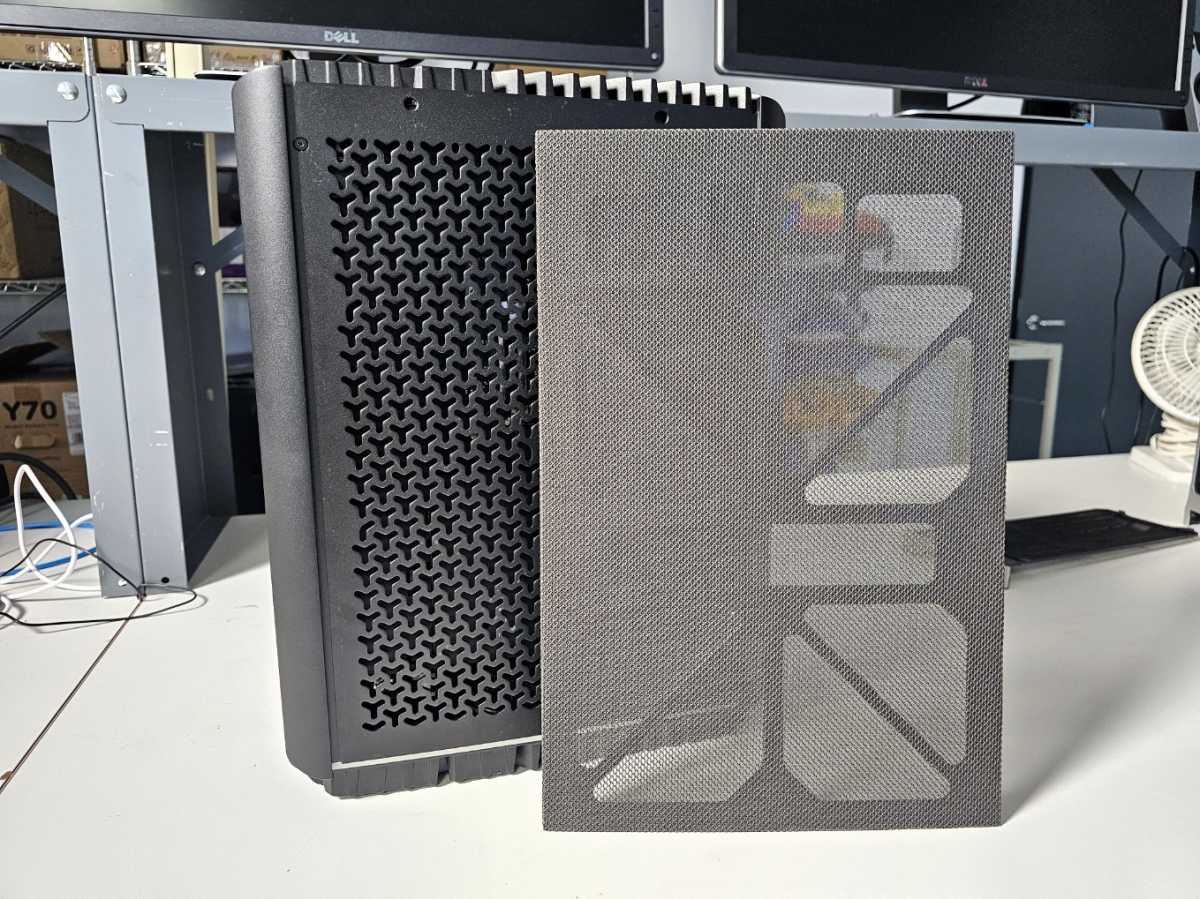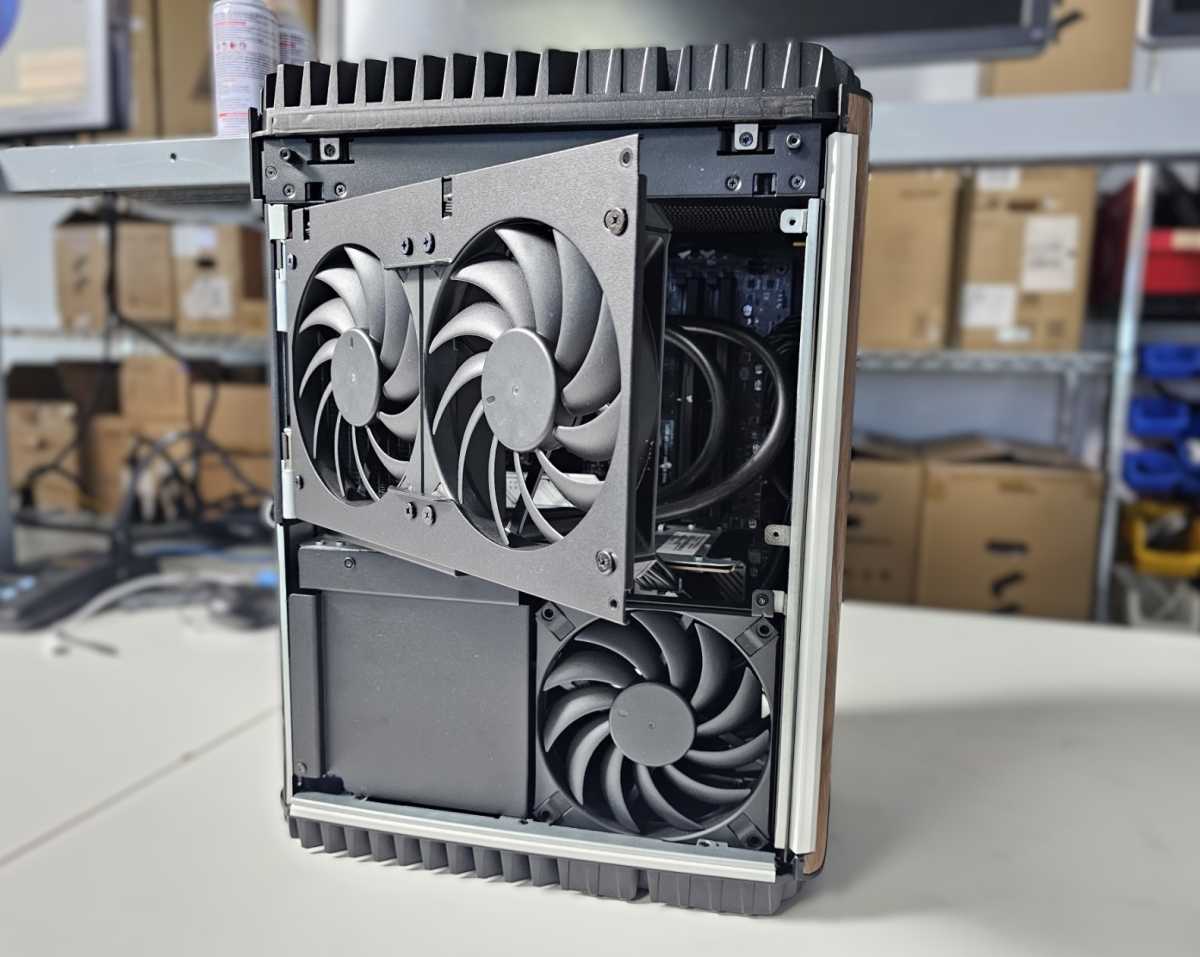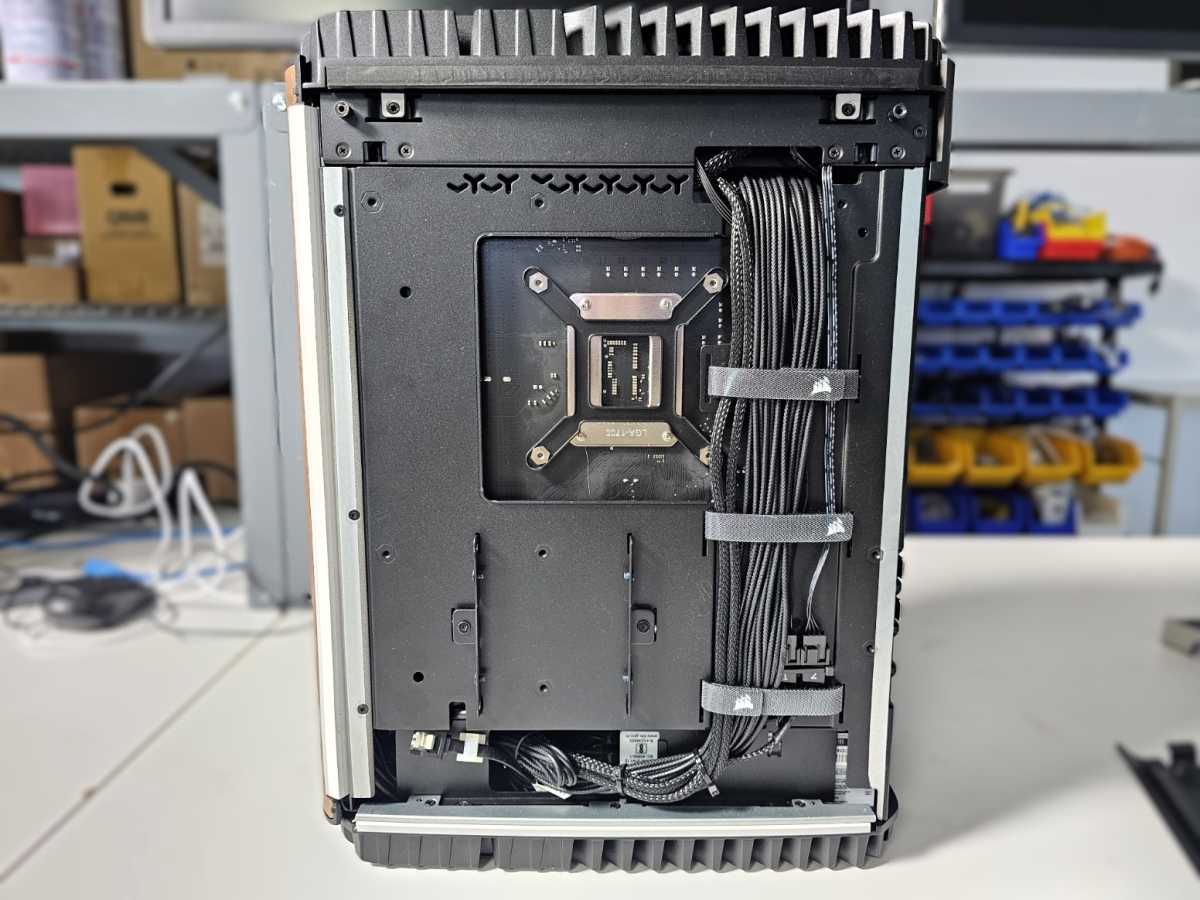- Регистрация
- 17 Февраль 2018
- Сообщения
- 30 596
- Лучшие ответы
- 0
- Баллы
- 2 093
Offline
Let’s address the big thing first: The Corsair One i500 compact gaming desktop costs $3,599. That will stop a lot of you in your tracks. Like a luxury automobile, however, there are touches throughout that signal why you’d want to spend the extra money on this lovely little PC.
I favor a very brutalist approach to PC hardware: I don’t really care what it looks like as long as it performs well and cost-effectively. But my personal aesthetic has always been very organic, and the i500’s genuine wood-paneled case plays into that perfectly.
On paper, the Corsair One i500 is an aggressive little machine. Inside is a Core i9-14900K processor and an Nvidia RTX 4080 Super, which is nearly the best of what you can buy today. All of that fits inside a compact little 22-liter chassis that’s perfectly suited toward a bookshelf: cool, quiet, compact, and understated, all characteristics normally associated with a cut above.
You can certainly buy your own case and components, and assemble them; it will certainly save you money. With the One, Corsair makes a strong argument that paying (a lot) extra can bring both aesthetic and practical benefits that aren’t immediately obvious.
Corsair One i500: The whole package argues for opening your wallet
My evaluation of the Corsair One i500 is a hybrid of formal review and a hands-on. We already have our hands full reviewing the dozens of laptops that come into our labs, and we normally write for the portion of our audience who buys and assembles their own PCs. Pre-built PCs like this one still offer peace of mind for someone without the time or technical aptitude to put their PC together, and it’s worth checking in to see what this segment of the market can achieve. Because we don’t cover pre-built PCs on a regular basis, though, you won’t find as many comparisons with competing products as in our laptop reviews.
I still couldn’t resist testing it, though. Wouldn’t you?
For starters, the warm aesthetics of the enclosure and the practicality of the case design are a winning combination. Add in a rather delightful interior, with backside cable routing and water-cooling, to what the Corsair One i500 offers on specs. There’s room for expansion, too. , it all totals up to $3,599, but I don’t think that’s an extraordinary amount when balanced against what this desktop offers.
, it all totals up to $3,599, but I don’t think that’s an extraordinary amount when balanced against what this desktop offers.
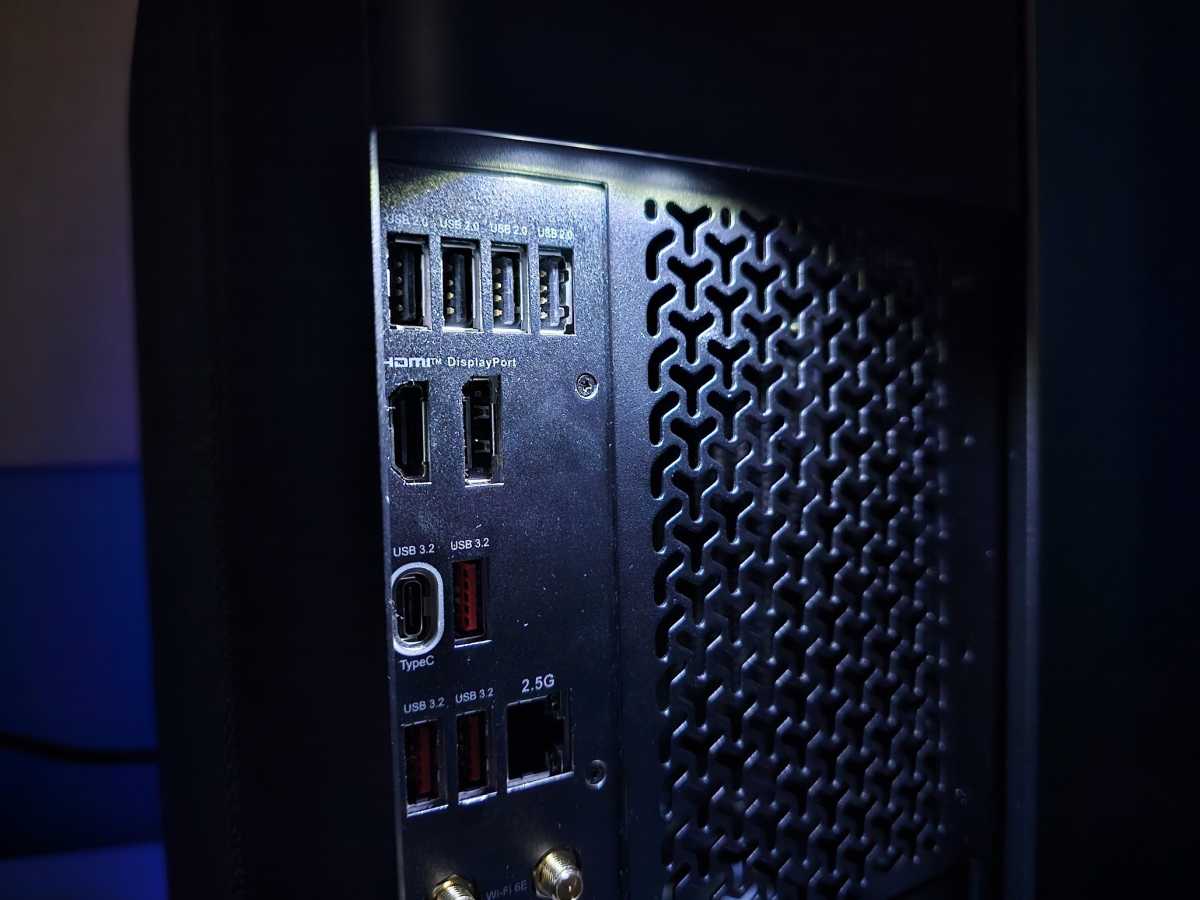
I’ll run through the other highlights of the Corsair One i500, but this impressed me most: No need to fumble around in the dark when a tap on the back lights everything up.
Mark Hachman / IDG
Corsair One i500 specifications
Corsair sent me the cheaper of two configurations, which retails for $3,599. A more expensive $4,699 option includes a Core i9-14900K, Nvidia RTX 4090, and a larger 64GB loadout of DDR5 RAM. Both desktops ship with a two-year warranty.
The Corsair One i500 is available in three colorways: a dark metal, or either bright- or dark-wood options. Unlike the 1980s minivan I grew up with, the wood is wood, certified by the Forest Stewardship Council with a unique wood grain. (I believe my “dark” wood was walnut.) To date, wooden accents have been typically reserved to niche cases, like the Fractal Design North, though they’ve become more popular as a stylistic backlash to RGB.
Don’t get me wrong, the Corsair One i500 has its share of RGB, in the form of LED strips that run down each of the front corners. The RGB is controlled by touch-sensitive strips above and below the front-mounted power button, which can adjust the lighting. More fine-grained controls are built into the Corsair One Dashboard app, however, which offers a surprisingly basic UI.
Compact power, and looks great too
Corsair One i500
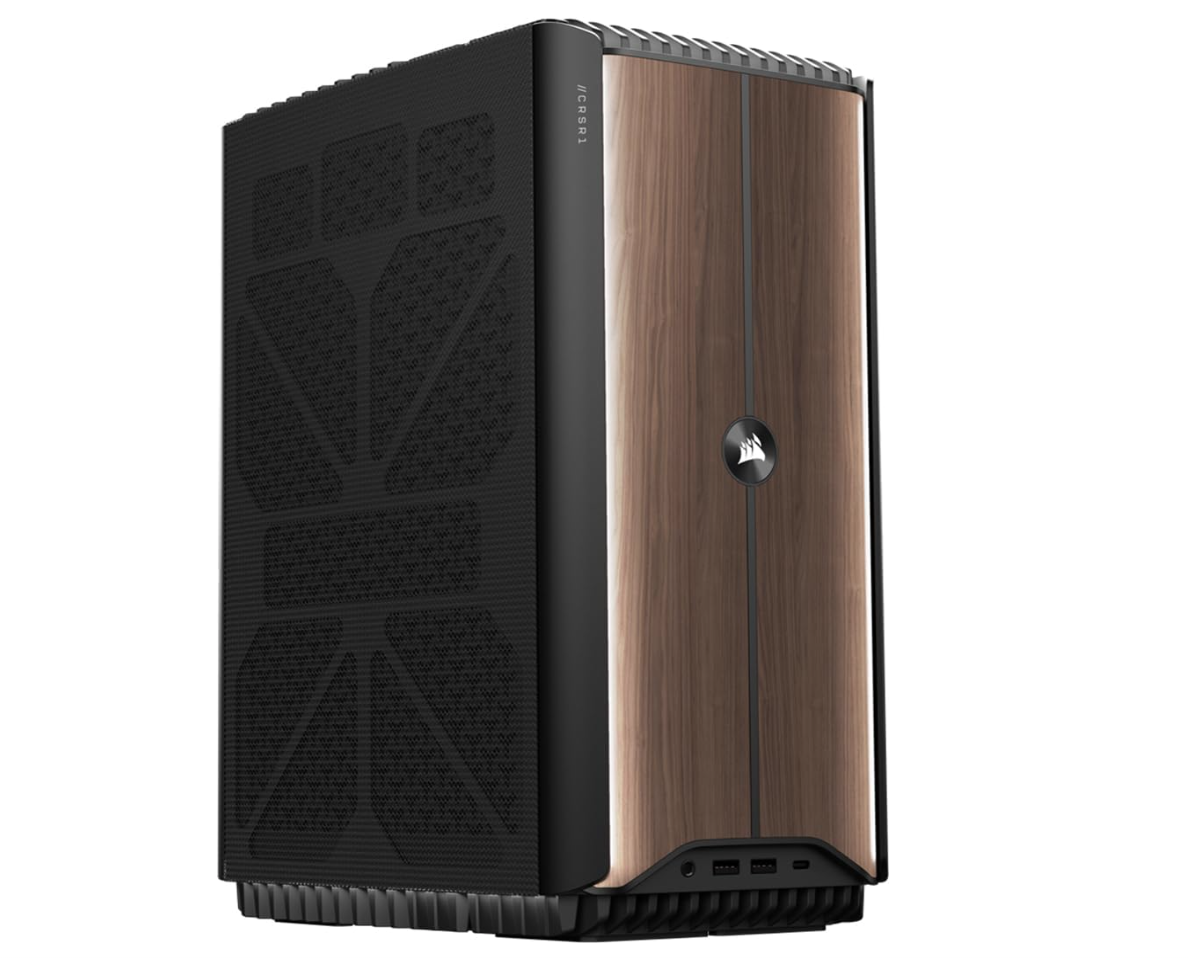
That’s indicative of one of the things that sets the Corsair One i500 apart. Some people prefer overt controls, and there’s a certain segment of the tech audience that revels in the ability to control every little thing with a dedicated knob or button. The i500 disagrees, and it works.
The case is enticingly compact: just 15.5 inches by 7.4 inches wide, and 11.8 inches deep, for a total volume of 22 liters. I prefer placing my desktop near my feet, largely because of a lack of desk space. But the Corsair One i500 is a PC you’ll want to show off, especially if your aesthetic leans toward the natural. I have a walnut antique roll-top desk that I bought decades ago because I’ve always liked old wood, but it’s just a bit too small to showcase the Corsair One i500 properly, which is a shame.
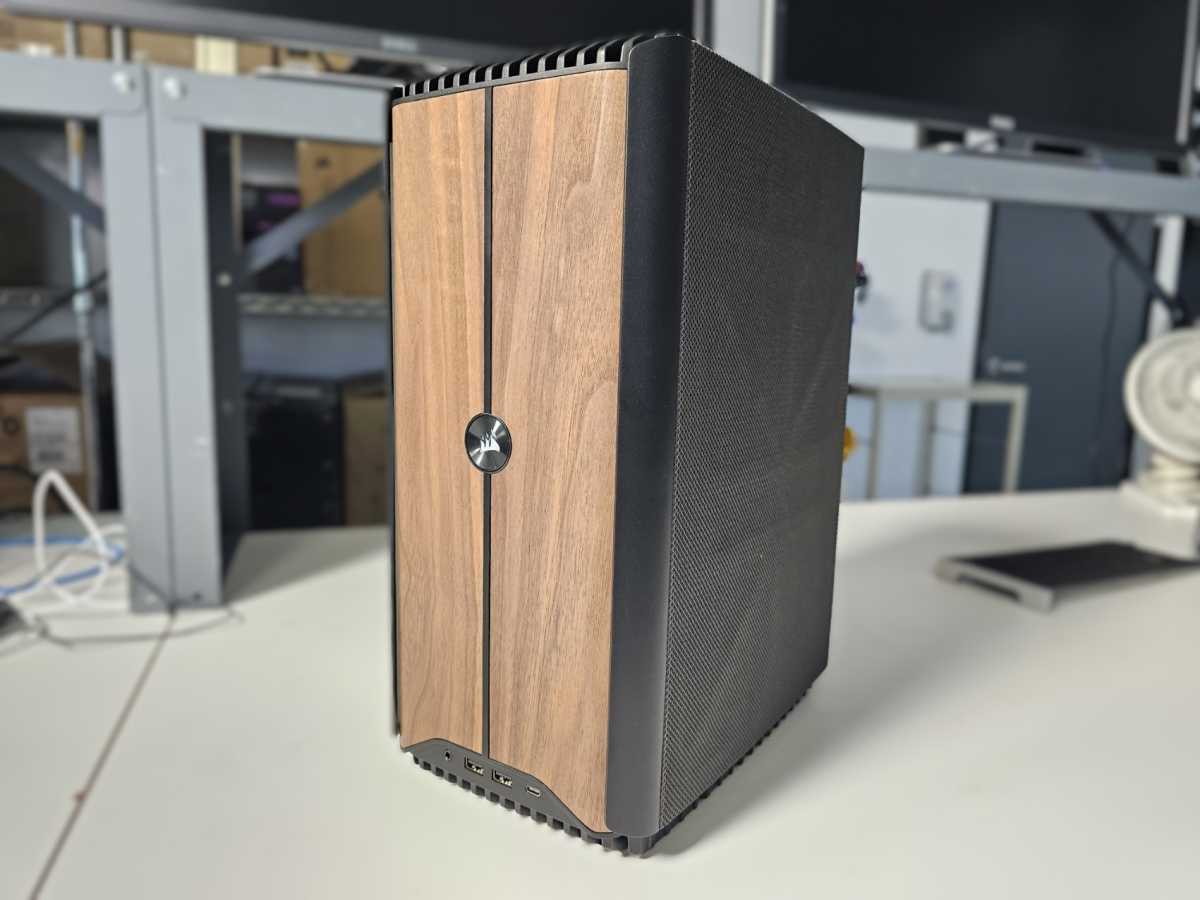
Corsair’s i500 looks as lovely in the lab as on a shelf, as in the image at the top of this review.
Mark Hachman / IDG
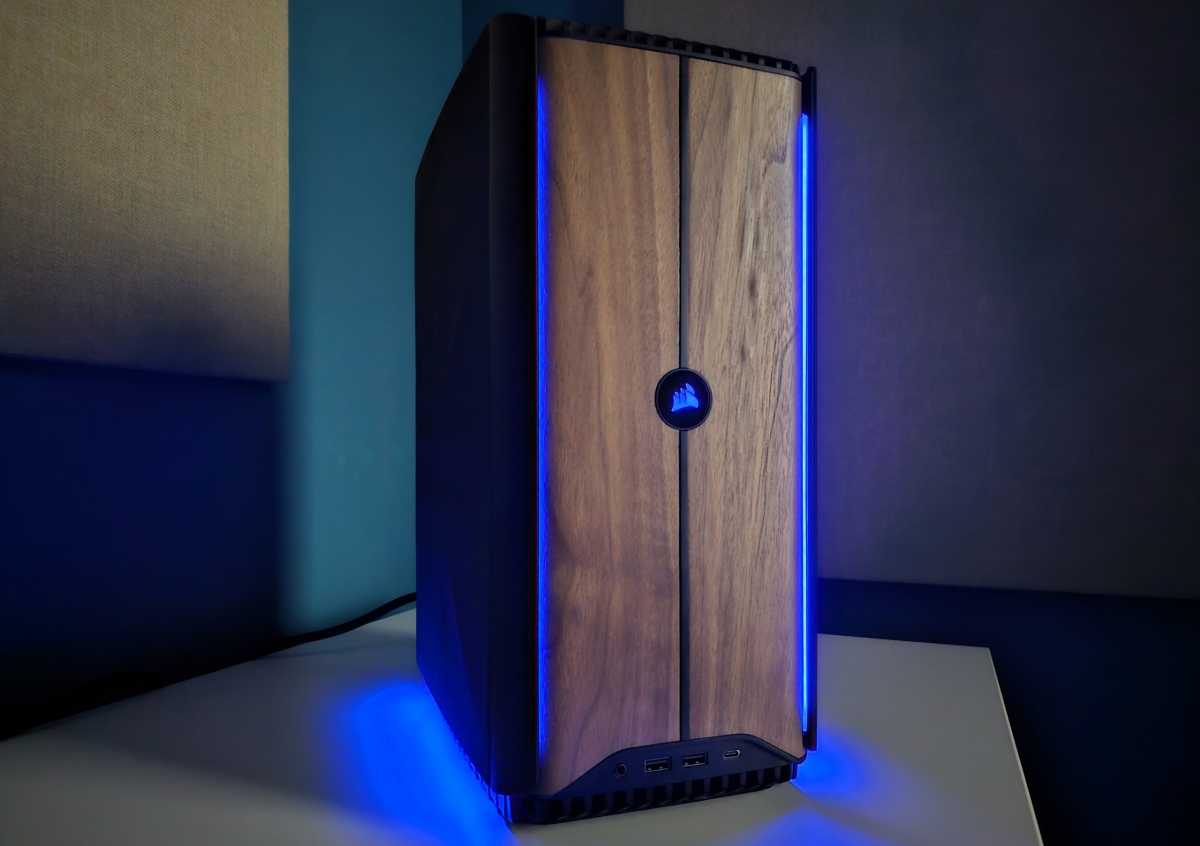
Corsair’s i500 offers understated RGB lighting that can be left on or off.
Mark Hachman / IDG
Inside the shipping container that Corsair sent me was also the power cord and Wi-Fi antennas, which screw in. I would encourage Corsair to invest in a longer power cord; the included cord is about 4 feet, and it was a just a bit too short for my desk setup.
I do like RGB, and what the i500 offers is understated, illuminating the corners with adjustable lighting. But you’ll have to decide whether it looks good against the wood. I don’t think so, but those who buy the metal option will probably feel differently.
There’s one feature that the Corsair One i500 offers that I love, and plays into my love of the practical alongside the i500’s aesthetic: one-touch rear lighting. If you’re like me, your PC is seated near or at your desk, in a somewhat dim room. (People prefer Windows’ dark mode for a reason!) That’s just fine for the 1,439 minutes that make up almost all of a day. But when you need to plug in a USB key, or a printer, or a keyboard cable, fishing around in the gloom for a minute or two to align a cable correctly gets old quick.
The i500 solves that problem. Tap the rear of the chassis, and a small LED illuminates the entire I/O panel. That’s amazing! No longer do you have to squint to make sure an HDMI cable is aligned properly. Don’t scoff; how many times do you use the illuminated vanity mirror on your car? Probably almost never — but you’ll certainly hear about it from a friend or partner if they can’t check themselves out as you whiz through the night to a social event.
I was delighted by the i500’s one-touch rear lighting. It’s indicative of the care and attention Corsair paid to the details.
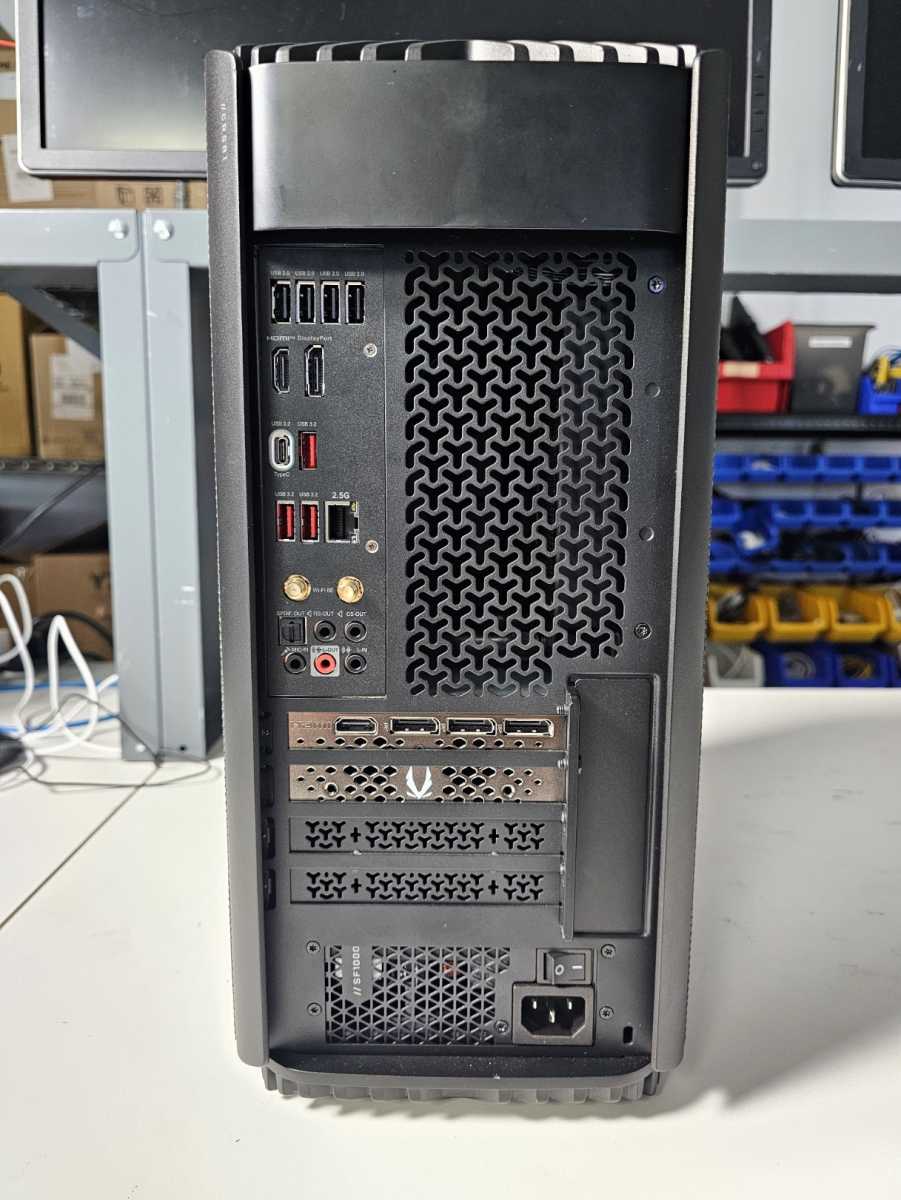
The rear I/O shield of the Corsair One i500 features numerous ports, though it skimps a little on USB-C. The single USB-C port on the rear is a 20Gbps port, a relative rarity but one designed to connect to a gaming SSD for storing game files.
Mark Hachman / IDG
The rear I/O includes four USB-A ports (5Gbps), another three running at 10Gbps, and a dedicated 20Gbps USB-C port, too. There’s also an audio jack. Though there’s an HDMI port connected to the integrated GPU via the Intel B760M chipset on the motherboard, there are three DisplayPort ports and an HDMI port directly attached to the graphics card.
One complaint I have is that there isn’t anything comparable for the front port, lighting-wise. Since there’s a pair of USB-A ports (and a USB-C port, plus a headphone jack) tucked under the front lip of the i500, it would be helpful to ensure those USB ports lined up correctly. I accidentally yanked my power strip off my shelf when I pulled the i500 forward to correctly align the USB-A port…which there are probably a bit too many of, too. One or two more USB-C ports would be convenient for modern setups.
The i500’s side panels serve as filters, and magnetically snap on to the sides of the chassis. Removing them is simple. I didn’t like the tiny black screws that affix the underlying metal grille, though; keep a magnetic screwdriver handy, and work on a light-colored surface. (Why not thumbscrews, Corsair?)
Opening the left-hand side of the case reveals the internals, with another grill whose screws need to be loosened. When you’ve done that, you can open the grill “door” and access the insides. The slideshow below will walk you through the process of opening the case and revealing the internals, as the other side of the motherboard.
About the only thing running through the interior of the system are the two watercooling hoses, which can be gently moved aside if you need to change out a component.
Otherwise, Corsair buries all the cabling behind the motherboard (behind the right side) and very neatly organizes the wires. There’s a lot of care that went into this design.
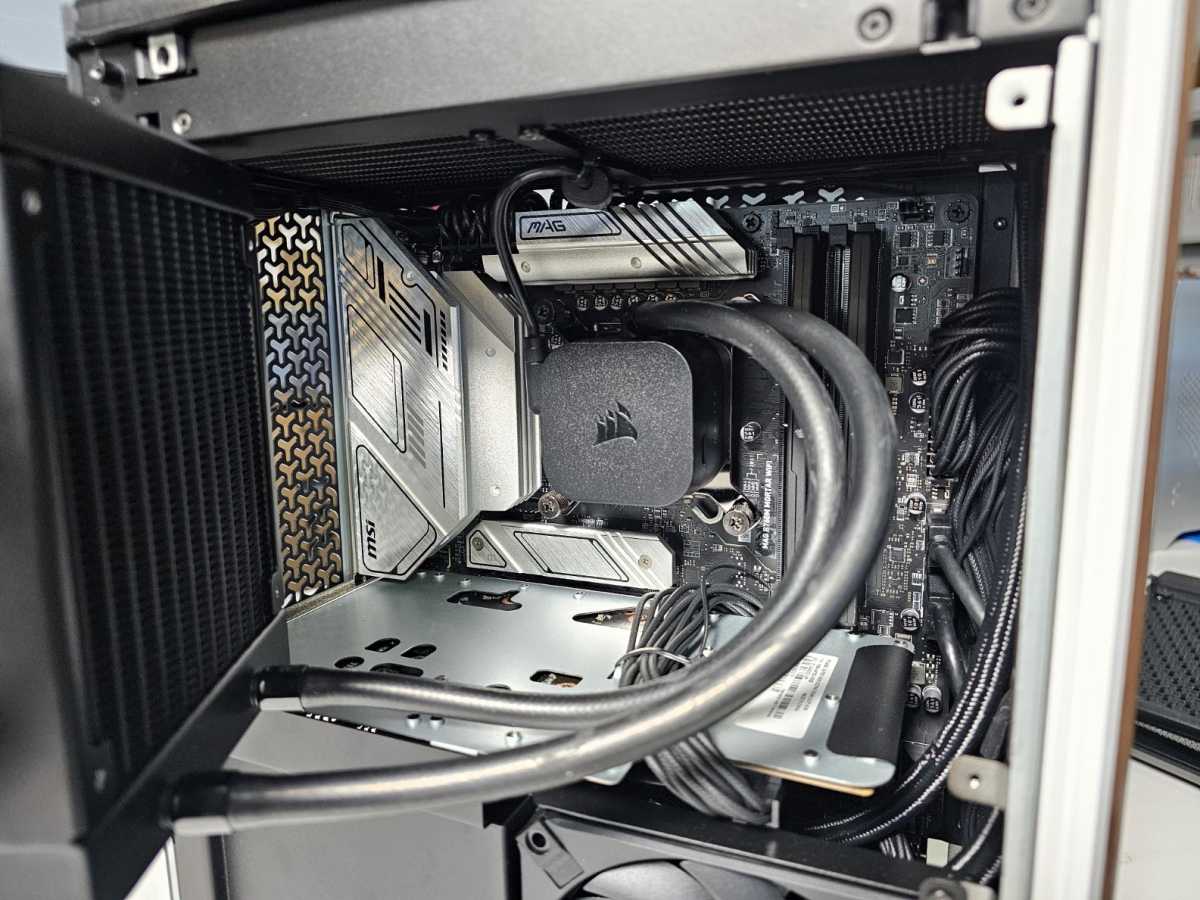
The interior of the Corsair One i500, which still has a bit of cable clutter. (On the right, two pieces of tubing route coolant from the GPU below to the top radiator.) The liquid cooling means that the system is less dependent on maintaining a clean interior, but it still helps.
Mark Hachman / IDG
Both GPU options include a 240mm GPU radiator plus two dedicated AF120 120 mm fans to cool it. The CPU also has its own 120mm cooler, too, along with a similar 120mm AF120 fan. Corsair mounts another 120mm fan on the bottom of the left side, to pull cool air underneath the graphics card, which essentially subdivides the case. Another 120mm fan pulls air from the top.
I didn’t try upgrading the chassis, but Corsair says that there’s an available x4 PCI Express expansion slot (with an effective length of 7 inches or less). Note that it’s a lot easier to swap out the M.2 slot and add memory, since access is granted via the upper “door”. (Two of the four memory slots were populated on my cheaper version of the Corsair One i500, with 32GB of memory.) Corsair makes a second M.2 slot available for upgrades, as well as a 2.5-inch SSD bay. Replacing the graphics card — which Corsair also allows for — requires more disassembly.
The one thing I really didn’t like about Corsair’s configuration was its approach to software. The Corsair One Dashboard app is good for adjusting the RGB (both colors and patterns, which include the typical strobing options, color shifts, and a starlight mode which makes parts of the RGB twinkle) but that’s about it. The app leaves room for fan monitoring, for example, but the sensors apparently weren’t connected. The Corsair One Diagnostics app leans more toward stability testing. Further tweaking options are left to the BIOS/UEFI, which isn’t that unusual and had the fine-grained tweaking options I expected.
BIOS updates require the user to download a firmware update, put it on a USB stick, and then apply it That seems rather primitive compared to the competition. I would have liked at-hand overclocking options, or the ability to scale up and down between silent running and maximum performance. Those options simply don’t seem to be there.
Corsair One i500 performance
Corsair doesn’t explicitly say that air will be pulled in from the physical bottom of the chassis, but it appears that it definitely could. I tested the Corsair One i500 on my floor, but on a hard surface that didn’t block airflow. Under normal operation, I couldn’t hear the i500 at all; it’s only under load that I heard the fans crank up. The noise was moderate though not overwhelming, and without coil whine. A quiet PC is one you can game and work on.
While this isn’t a formal review, I couldn’t help but run a few benchmarks to test gaming performance. If you aren’t familiar with the nuances differentiating a 4080 Super from a “vanilla” 4080, the Super has a few more CUDA cores (10,240 vs 9,728) and runs at a slightly higher clock speed (2,295MHz vs 2,205 MHz). There’s a slight performance improvement, of course, of a few percent.
I recently tested the Acer Predator Orion 3000, a $1,699 desktop with an older Core i7-13700F chip and a GeForce RTX 4070 chip inside. I’d expect the 4080 Super to somewhat outperform the Acer’s 4070 GPU, though the 13th- and 14th-gen Core chips aren’t that far apart in terms of performance.
I also added a couple of gaming notebooks from our database, including the $3,700 Gigabyte Aorus 17X (Core i9-14900HX/RTX 4090) and the Dell Alienware x16 R2, a $3,199 gaming notebook with an Intel Core Ultra 9 185H and an RTX 4080 inside.
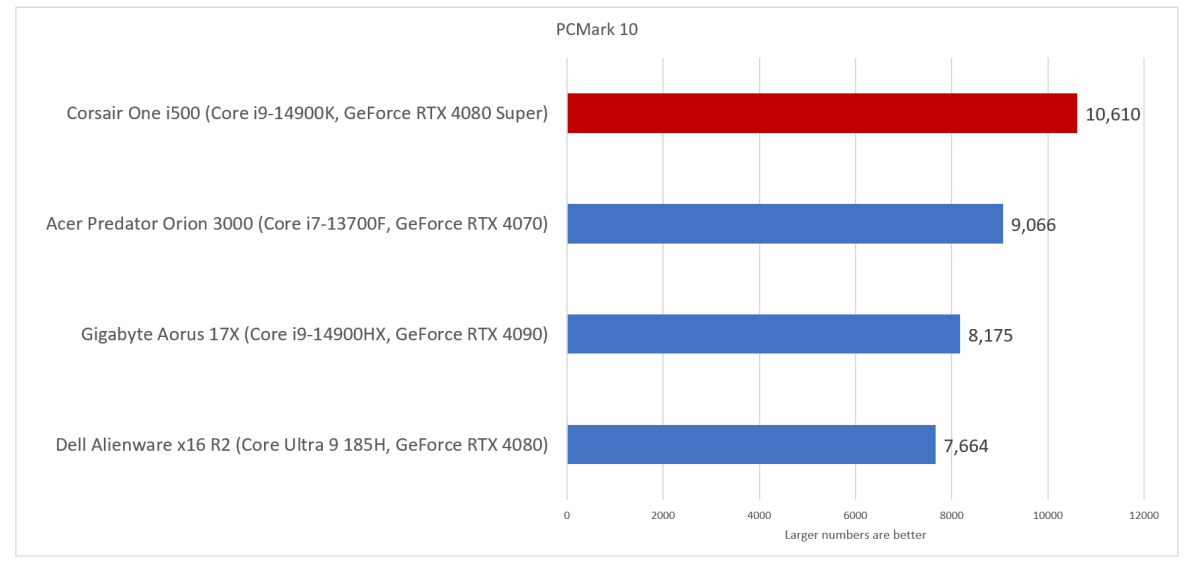
Mark Hachman / IDG
This is a gaming desktop, but you might use it during the day for “work,” right? We ran the PCMark 10 benchmark for comparative performance. With a score of over 10,000, this desktop made short work of the benchmark, which includes CAD elements to push the GPU a bit. Again, the fact that the i500 ran this benchmark largely silently is a good sign.
We’re in the middle of re-evaluating how we assess gaming performance, but we have two games that we’ve stuck with: Shadow of the Tomb Raider, and Metro: Exodus. We’ve tended to prioritize 1080p performance on both, though gaming is slowly climbing into the 1440p range, and the 4080 Super inside the Corsair One will be able to play at that resolution (as well as 4K) without breaking a sweat.
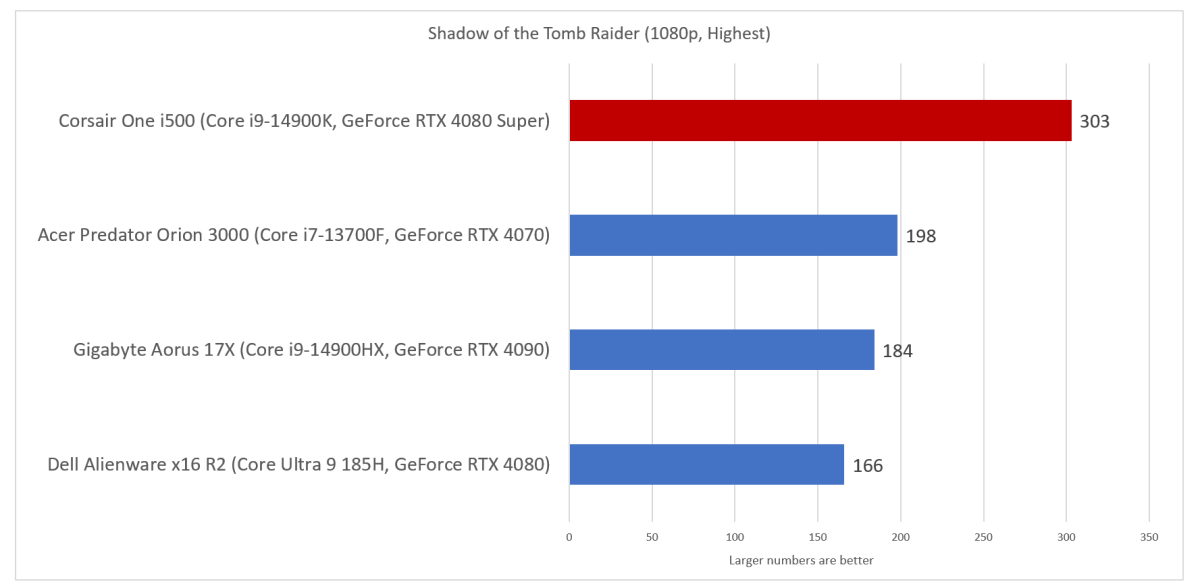
Mark Hachman / IDG
If you do stick with 1080p gaming as your priority, this desktop will easily include the older Tomb Raider game, though it struggles a bit with the Metro release.
It’s worth noting that with Metro (we use the “Extreme settings), the “99th-percentile” score dropped down to 77 frames per second, which is playable, though a little less than some would prefer.
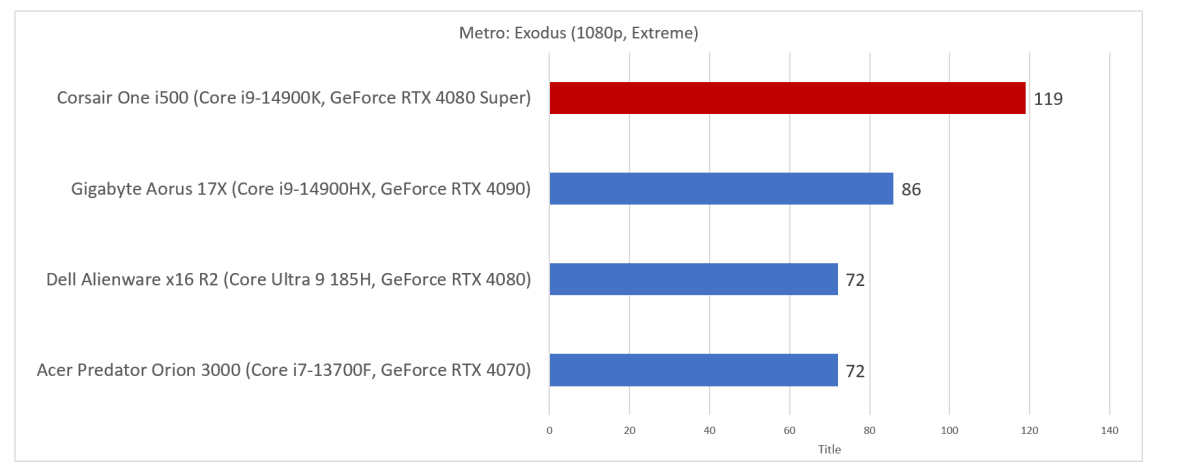
Mark Hachman / IDG
To this we added two more games: Cyberpunk: 2077 and Assassins Creed: Valhalla.
Cyberpunk: 2077, in addition to (eventually) becoming a deep, rich gaming experience, also provides a wealth of benchmarking options to examine the performance of a laptop or desktop. We’ve used our legacy settings for this test, which have been tested on just a couple of desktops and laptops. Here, I’m making a direct comparison between the Corsair desktop and the Asus Predator Orion 3000.
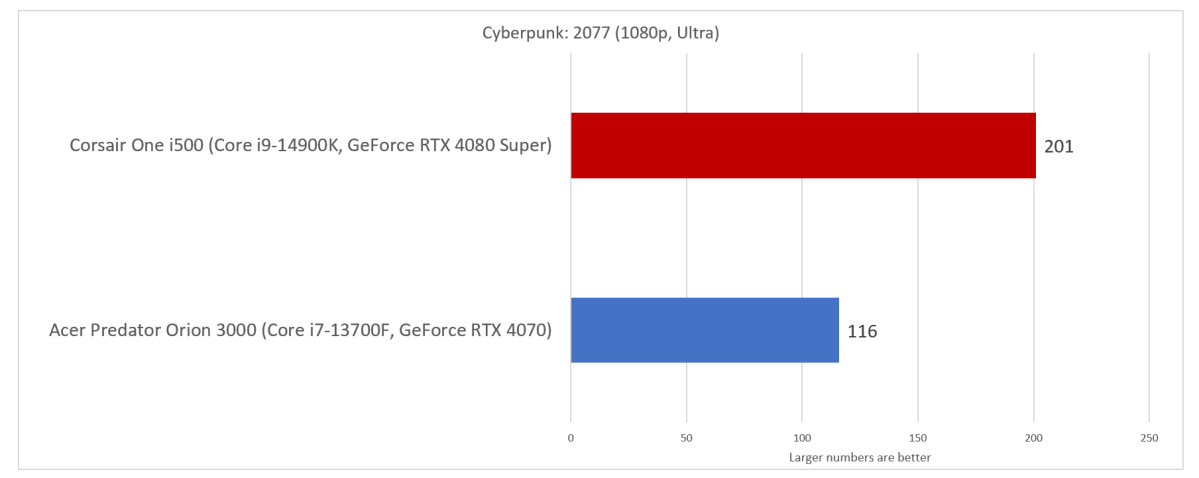
Mark Hachman / IDG
We’re considering tweaking these settings, turning on basic ray tracing and enabling frame generation. With these options enabled (at High settings), Cyberpunk is easily playable at over 300 fps. At 1080p and High settings, AC:V is perfectly playable, too, at 226 fps. Chances are that you’ll want to dial up the graphics settings a bit to show the game off a bit more without hurting performance.
Should you buy the Corsair One i500?
Again, if you can’t get past the $3,599 price point, I can understand. I grew up in a minivan, though my parents now own a luxury sedan. Both have cup holders, four wheels and an engine, but there are little bits of polish and thought that help you understand while you might opt for the pricier option.
There’s a lot that Corsair offers here that goes beyond just the specs. I really do love the design, which feels unique. There’s a reason why Fractal cases receive attention, as they feel emotionally warmer and more organic than a traditional case. Corsair’s upgradability is somewhat nominal, but it is there. You’d almost hope that Corsair would create a version of the i500 with AMD’s AM4 or AM5 socket, to truly allow this PC to sit on someone’s shelf for years.
True, the RGB feels out of sync with the aesthetic and the software is average at best. Still, there aren’t too many other knocks against it. And though my colleagues tell me that yes, a rear-mounted LED has been done before, I’m not going to nitpick. Corsair engineers made some smart, thoughtful decisions in creating the Corsair One i500, creating a well-rounded, cohesive compact PC with just very few quibbles to make.
I favor a very brutalist approach to PC hardware: I don’t really care what it looks like as long as it performs well and cost-effectively. But my personal aesthetic has always been very organic, and the i500’s genuine wood-paneled case plays into that perfectly.
On paper, the Corsair One i500 is an aggressive little machine. Inside is a Core i9-14900K processor and an Nvidia RTX 4080 Super, which is nearly the best of what you can buy today. All of that fits inside a compact little 22-liter chassis that’s perfectly suited toward a bookshelf: cool, quiet, compact, and understated, all characteristics normally associated with a cut above.
You can certainly buy your own case and components, and assemble them; it will certainly save you money. With the One, Corsair makes a strong argument that paying (a lot) extra can bring both aesthetic and practical benefits that aren’t immediately obvious.
Corsair One i500: The whole package argues for opening your wallet
My evaluation of the Corsair One i500 is a hybrid of formal review and a hands-on. We already have our hands full reviewing the dozens of laptops that come into our labs, and we normally write for the portion of our audience who buys and assembles their own PCs. Pre-built PCs like this one still offer peace of mind for someone without the time or technical aptitude to put their PC together, and it’s worth checking in to see what this segment of the market can achieve. Because we don’t cover pre-built PCs on a regular basis, though, you won’t find as many comparisons with competing products as in our laptop reviews.
I still couldn’t resist testing it, though. Wouldn’t you?
For starters, the warm aesthetics of the enclosure and the practicality of the case design are a winning combination. Add in a rather delightful interior, with backside cable routing and water-cooling, to what the Corsair One i500 offers on specs. There’s room for expansion, too.
 , it all totals up to $3,599, but I don’t think that’s an extraordinary amount when balanced against what this desktop offers.
, it all totals up to $3,599, but I don’t think that’s an extraordinary amount when balanced against what this desktop offers.
I’ll run through the other highlights of the Corsair One i500, but this impressed me most: No need to fumble around in the dark when a tap on the back lights everything up.
Mark Hachman / IDG
Corsair One i500 specifications
Corsair sent me the cheaper of two configurations, which retails for $3,599. A more expensive $4,699 option includes a Core i9-14900K, Nvidia RTX 4090, and a larger 64GB loadout of DDR5 RAM. Both desktops ship with a two-year warranty.
- Processor: Intel Core i9-14900K
- Graphics: Nvidia GeForce RTX 4080 Super
- Memory: 32GB (2x16GB) DDR5-6000
- Storage: 2TB NVMe SSD
- Ports: 2 USB-A (5Gbps), 1 USB-C (10Gbps), 4 USB-A (480Mbps) 3 USB-C 10Gbps, USB-C (20Gps, 2×2), 7.1 audio jack, headphone jack
- Wired connection: 2.5Gbps Ethernet
- Wireless: WiFi 6e; Bluetooth 5.3
- Operating system: Windows 11 Home
- Dimensions (inches): 15.5in. x 7.4in. x 11.8in.
- Weight: 21.2 lb
- Colors: Metal Dark, Wood Bright, Wood Dark
- Also in the box: power cord, Wi-Fi antennas
- Price: $3,599.99
The Corsair One i500 is available in three colorways: a dark metal, or either bright- or dark-wood options. Unlike the 1980s minivan I grew up with, the wood is wood, certified by the Forest Stewardship Council with a unique wood grain. (I believe my “dark” wood was walnut.) To date, wooden accents have been typically reserved to niche cases, like the Fractal Design North, though they’ve become more popular as a stylistic backlash to RGB.
Don’t get me wrong, the Corsair One i500 has its share of RGB, in the form of LED strips that run down each of the front corners. The RGB is controlled by touch-sensitive strips above and below the front-mounted power button, which can adjust the lighting. More fine-grained controls are built into the Corsair One Dashboard app, however, which offers a surprisingly basic UI.
Compact power, and looks great too
Corsair One i500

That’s indicative of one of the things that sets the Corsair One i500 apart. Some people prefer overt controls, and there’s a certain segment of the tech audience that revels in the ability to control every little thing with a dedicated knob or button. The i500 disagrees, and it works.
The case is enticingly compact: just 15.5 inches by 7.4 inches wide, and 11.8 inches deep, for a total volume of 22 liters. I prefer placing my desktop near my feet, largely because of a lack of desk space. But the Corsair One i500 is a PC you’ll want to show off, especially if your aesthetic leans toward the natural. I have a walnut antique roll-top desk that I bought decades ago because I’ve always liked old wood, but it’s just a bit too small to showcase the Corsair One i500 properly, which is a shame.

Corsair’s i500 looks as lovely in the lab as on a shelf, as in the image at the top of this review.
Mark Hachman / IDG

Corsair’s i500 offers understated RGB lighting that can be left on or off.
Mark Hachman / IDG
Inside the shipping container that Corsair sent me was also the power cord and Wi-Fi antennas, which screw in. I would encourage Corsair to invest in a longer power cord; the included cord is about 4 feet, and it was a just a bit too short for my desk setup.
I do like RGB, and what the i500 offers is understated, illuminating the corners with adjustable lighting. But you’ll have to decide whether it looks good against the wood. I don’t think so, but those who buy the metal option will probably feel differently.
There’s one feature that the Corsair One i500 offers that I love, and plays into my love of the practical alongside the i500’s aesthetic: one-touch rear lighting. If you’re like me, your PC is seated near or at your desk, in a somewhat dim room. (People prefer Windows’ dark mode for a reason!) That’s just fine for the 1,439 minutes that make up almost all of a day. But when you need to plug in a USB key, or a printer, or a keyboard cable, fishing around in the gloom for a minute or two to align a cable correctly gets old quick.
The i500 solves that problem. Tap the rear of the chassis, and a small LED illuminates the entire I/O panel. That’s amazing! No longer do you have to squint to make sure an HDMI cable is aligned properly. Don’t scoff; how many times do you use the illuminated vanity mirror on your car? Probably almost never — but you’ll certainly hear about it from a friend or partner if they can’t check themselves out as you whiz through the night to a social event.
I was delighted by the i500’s one-touch rear lighting. It’s indicative of the care and attention Corsair paid to the details.

The rear I/O shield of the Corsair One i500 features numerous ports, though it skimps a little on USB-C. The single USB-C port on the rear is a 20Gbps port, a relative rarity but one designed to connect to a gaming SSD for storing game files.
Mark Hachman / IDG
The rear I/O includes four USB-A ports (5Gbps), another three running at 10Gbps, and a dedicated 20Gbps USB-C port, too. There’s also an audio jack. Though there’s an HDMI port connected to the integrated GPU via the Intel B760M chipset on the motherboard, there are three DisplayPort ports and an HDMI port directly attached to the graphics card.
One complaint I have is that there isn’t anything comparable for the front port, lighting-wise. Since there’s a pair of USB-A ports (and a USB-C port, plus a headphone jack) tucked under the front lip of the i500, it would be helpful to ensure those USB ports lined up correctly. I accidentally yanked my power strip off my shelf when I pulled the i500 forward to correctly align the USB-A port…which there are probably a bit too many of, too. One or two more USB-C ports would be convenient for modern setups.
The i500’s side panels serve as filters, and magnetically snap on to the sides of the chassis. Removing them is simple. I didn’t like the tiny black screws that affix the underlying metal grille, though; keep a magnetic screwdriver handy, and work on a light-colored surface. (Why not thumbscrews, Corsair?)
Opening the left-hand side of the case reveals the internals, with another grill whose screws need to be loosened. When you’ve done that, you can open the grill “door” and access the insides. The slideshow below will walk you through the process of opening the case and revealing the internals, as the other side of the motherboard.
About the only thing running through the interior of the system are the two watercooling hoses, which can be gently moved aside if you need to change out a component.
Otherwise, Corsair buries all the cabling behind the motherboard (behind the right side) and very neatly organizes the wires. There’s a lot of care that went into this design.

The interior of the Corsair One i500, which still has a bit of cable clutter. (On the right, two pieces of tubing route coolant from the GPU below to the top radiator.) The liquid cooling means that the system is less dependent on maintaining a clean interior, but it still helps.
Mark Hachman / IDG
Both GPU options include a 240mm GPU radiator plus two dedicated AF120 120 mm fans to cool it. The CPU also has its own 120mm cooler, too, along with a similar 120mm AF120 fan. Corsair mounts another 120mm fan on the bottom of the left side, to pull cool air underneath the graphics card, which essentially subdivides the case. Another 120mm fan pulls air from the top.
I didn’t try upgrading the chassis, but Corsair says that there’s an available x4 PCI Express expansion slot (with an effective length of 7 inches or less). Note that it’s a lot easier to swap out the M.2 slot and add memory, since access is granted via the upper “door”. (Two of the four memory slots were populated on my cheaper version of the Corsair One i500, with 32GB of memory.) Corsair makes a second M.2 slot available for upgrades, as well as a 2.5-inch SSD bay. Replacing the graphics card — which Corsair also allows for — requires more disassembly.
The one thing I really didn’t like about Corsair’s configuration was its approach to software. The Corsair One Dashboard app is good for adjusting the RGB (both colors and patterns, which include the typical strobing options, color shifts, and a starlight mode which makes parts of the RGB twinkle) but that’s about it. The app leaves room for fan monitoring, for example, but the sensors apparently weren’t connected. The Corsair One Diagnostics app leans more toward stability testing. Further tweaking options are left to the BIOS/UEFI, which isn’t that unusual and had the fine-grained tweaking options I expected.
BIOS updates require the user to download a firmware update, put it on a USB stick, and then apply it That seems rather primitive compared to the competition. I would have liked at-hand overclocking options, or the ability to scale up and down between silent running and maximum performance. Those options simply don’t seem to be there.
Corsair One i500 performance
Corsair doesn’t explicitly say that air will be pulled in from the physical bottom of the chassis, but it appears that it definitely could. I tested the Corsair One i500 on my floor, but on a hard surface that didn’t block airflow. Under normal operation, I couldn’t hear the i500 at all; it’s only under load that I heard the fans crank up. The noise was moderate though not overwhelming, and without coil whine. A quiet PC is one you can game and work on.
While this isn’t a formal review, I couldn’t help but run a few benchmarks to test gaming performance. If you aren’t familiar with the nuances differentiating a 4080 Super from a “vanilla” 4080, the Super has a few more CUDA cores (10,240 vs 9,728) and runs at a slightly higher clock speed (2,295MHz vs 2,205 MHz). There’s a slight performance improvement, of course, of a few percent.
I recently tested the Acer Predator Orion 3000, a $1,699 desktop with an older Core i7-13700F chip and a GeForce RTX 4070 chip inside. I’d expect the 4080 Super to somewhat outperform the Acer’s 4070 GPU, though the 13th- and 14th-gen Core chips aren’t that far apart in terms of performance.
I also added a couple of gaming notebooks from our database, including the $3,700 Gigabyte Aorus 17X (Core i9-14900HX/RTX 4090) and the Dell Alienware x16 R2, a $3,199 gaming notebook with an Intel Core Ultra 9 185H and an RTX 4080 inside.

Mark Hachman / IDG
This is a gaming desktop, but you might use it during the day for “work,” right? We ran the PCMark 10 benchmark for comparative performance. With a score of over 10,000, this desktop made short work of the benchmark, which includes CAD elements to push the GPU a bit. Again, the fact that the i500 ran this benchmark largely silently is a good sign.
We’re in the middle of re-evaluating how we assess gaming performance, but we have two games that we’ve stuck with: Shadow of the Tomb Raider, and Metro: Exodus. We’ve tended to prioritize 1080p performance on both, though gaming is slowly climbing into the 1440p range, and the 4080 Super inside the Corsair One will be able to play at that resolution (as well as 4K) without breaking a sweat.

Mark Hachman / IDG
If you do stick with 1080p gaming as your priority, this desktop will easily include the older Tomb Raider game, though it struggles a bit with the Metro release.
It’s worth noting that with Metro (we use the “Extreme settings), the “99th-percentile” score dropped down to 77 frames per second, which is playable, though a little less than some would prefer.

Mark Hachman / IDG
To this we added two more games: Cyberpunk: 2077 and Assassins Creed: Valhalla.
Cyberpunk: 2077, in addition to (eventually) becoming a deep, rich gaming experience, also provides a wealth of benchmarking options to examine the performance of a laptop or desktop. We’ve used our legacy settings for this test, which have been tested on just a couple of desktops and laptops. Here, I’m making a direct comparison between the Corsair desktop and the Asus Predator Orion 3000.

Mark Hachman / IDG
We’re considering tweaking these settings, turning on basic ray tracing and enabling frame generation. With these options enabled (at High settings), Cyberpunk is easily playable at over 300 fps. At 1080p and High settings, AC:V is perfectly playable, too, at 226 fps. Chances are that you’ll want to dial up the graphics settings a bit to show the game off a bit more without hurting performance.
Should you buy the Corsair One i500?
Again, if you can’t get past the $3,599 price point, I can understand. I grew up in a minivan, though my parents now own a luxury sedan. Both have cup holders, four wheels and an engine, but there are little bits of polish and thought that help you understand while you might opt for the pricier option.
There’s a lot that Corsair offers here that goes beyond just the specs. I really do love the design, which feels unique. There’s a reason why Fractal cases receive attention, as they feel emotionally warmer and more organic than a traditional case. Corsair’s upgradability is somewhat nominal, but it is there. You’d almost hope that Corsair would create a version of the i500 with AMD’s AM4 or AM5 socket, to truly allow this PC to sit on someone’s shelf for years.
True, the RGB feels out of sync with the aesthetic and the software is average at best. Still, there aren’t too many other knocks against it. And though my colleagues tell me that yes, a rear-mounted LED has been done before, I’m not going to nitpick. Corsair engineers made some smart, thoughtful decisions in creating the Corsair One i500, creating a well-rounded, cohesive compact PC with just very few quibbles to make.

